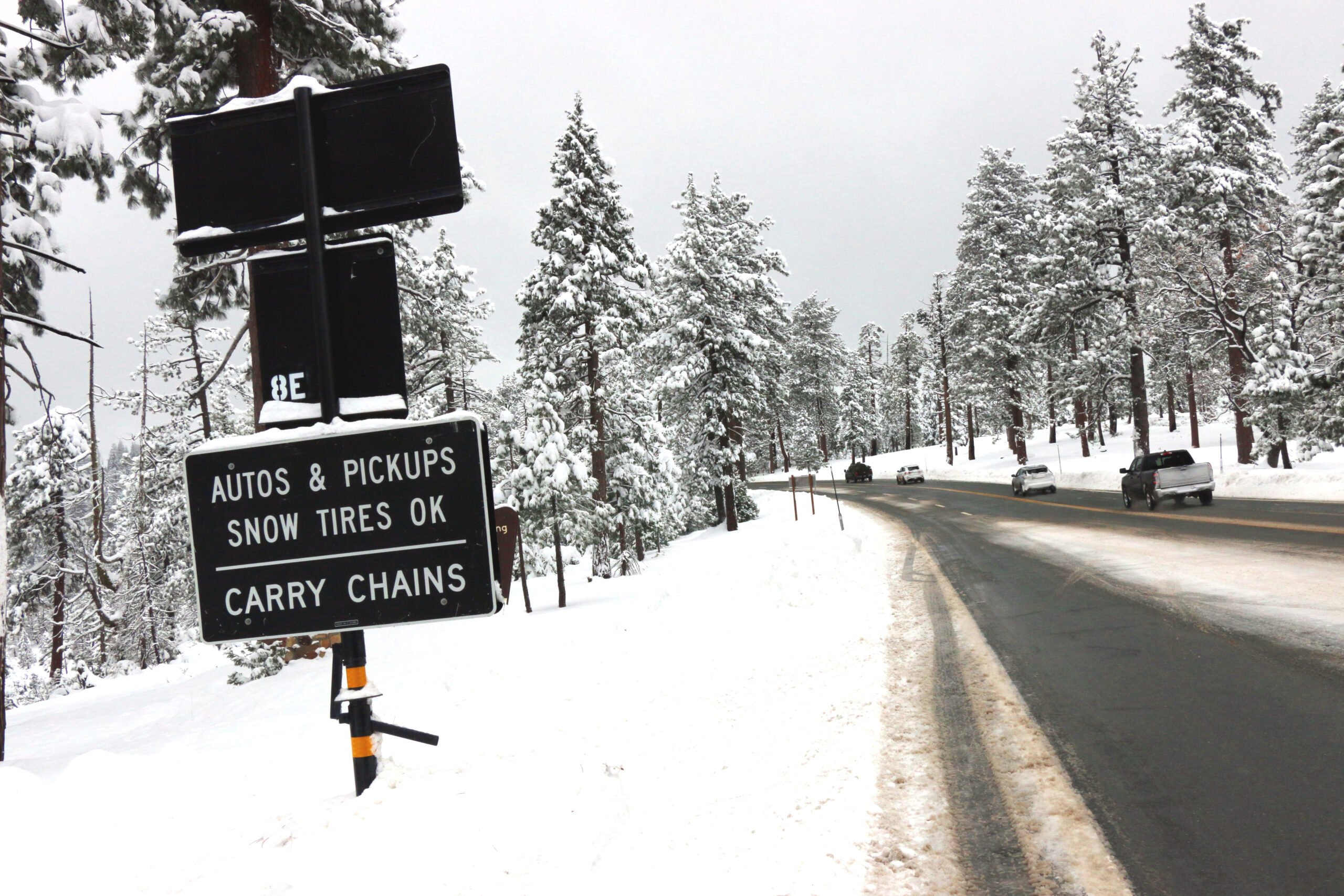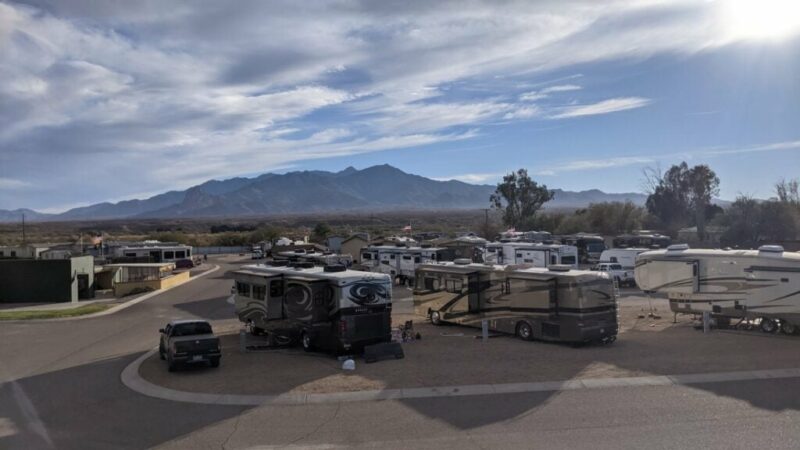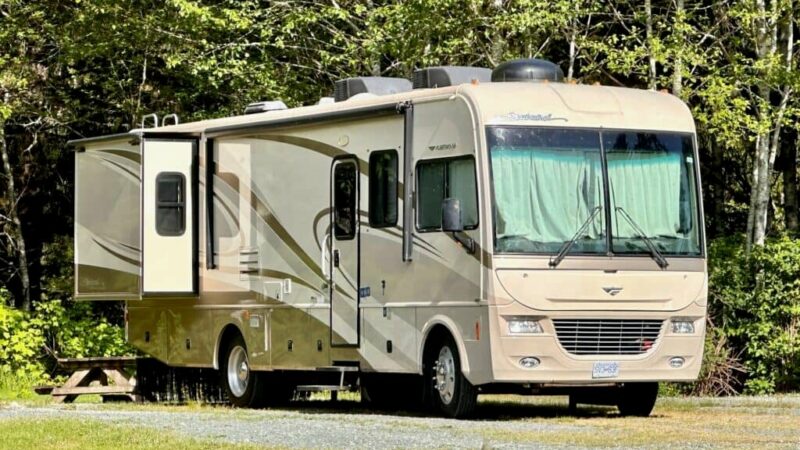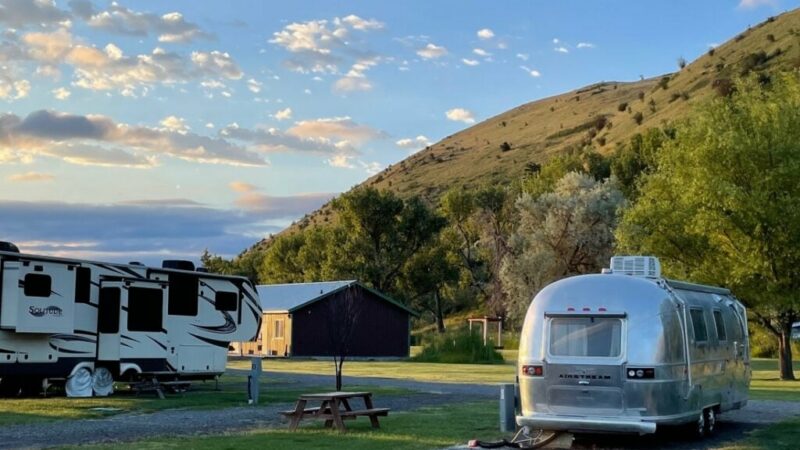Do You Need Snow Chains For Travel Trailers?

Added traction makes driving safer when trailer towing in winter.
Can You Use Snow Chains On A Travel Trailer?
Driving in winter weather always poses a few risks, especially if you’re hauling a travel trailer behind you. This leads to a common question: Do you need snow chains for your travel trailer?
Since tire chains are most effective on the primary driving tires, some people wonder whether or not they’re necessary for travel trailers. Generally speaking, snow chains can be helpful for travel trailers, even though the tires on these vehicles are not primarily used to drive motion. With that extra traction, you’ll reduce your risk of sliding and flipping, which is always a good thing when you’re driving an RV.
The benefits of snow chains for RVs
During wet weather, the odds of sliding or crashing increase because of your vehicle size, weight, and lack of control. Drivers who travel during the colder months need to bring some extra equipment and take precautions when driving on roads that are icy, snowy, or poorly maintained. Snow chains are one way to do it.
- They can help drivers of any vehicle stay safe during the winter.
- Snow chains wrap around the tread of tires and are designed to provide extra grip on difficult terrain.
- Tires with chains or other grips on them make it easier to pull yourself out of deep snow and prevent vehicle tires from spinning out pointlessly.
Below we’ll break down some of the pros and cons of travel trailer snow chains, as well as some alternatives to explore.
When to use snow chains
Snow chains are definitely useful pieces of equipment, but you shouldn’t drive with them on all the time. If you use them on clear roads, you could end up damaging the chains and your tires. You should only use them on a case-by-case basis.
As the name implies, these items are most useful when there’s snow and ice on the roads. Even a thin layer can cause your vehicle to slide out of control, so any extra bit of traction can help. These chains are most useful when you’re driving on poorly-maintained roads, steep inclines, or areas with heavy snow and ice coverage.
The chains should be placed on the wheels that are doing the most work. If you have four-wheel drive, you’ll need enough chains for all four wheels. Travel trailer owners may need to carry several extra sets. The wheels on these vehicles usually just follow the path of everything else, but chains can prevent them from sliding out.
Basically, you should use your chains whenever you think your tow vehicle or trailer might slide out of control, whether that’s for side-to-side or forward motion. The last thing you want is to be unable to stop when needed.
The pros and cons of snow chains
Pros
One of the best things about snow chains on travel trailers is that they’re pretty easy to install. Just lay them out, wrap them around the tire, drive forward a bit, then tighten everything up. It’s a quick and easy process to take them on and off.
Of course, snow chains also give you extra grip and traction during hazardous road conditions. You’ll reduce your risk of sliding and crashing, which is always a good thing. Trailer sway is no joke, especially during the winter.
In addition, tire chains can help you get in and out of tough spots. Other vehicles might become stuck in deep snow, but the chains will help you move forward instead of pointlessly spinning your wheels.
Whether you plan to use them or not, it’s a good idea to travel with a set of snow chains. Some states require you to use them if your vehicle is over a certain weight threshold. For instance, the state of Washington’s snow chains law requires that all vehicles over 10,000 lbs use tire chains on risky winter roads.
So, even if you don’t want to use them, you can avoid a ticket if you keep a set of tire chains on hand. Better safe than sorry!
Cons
Unfortunately, there are a few drawbacks to snow chains. For starters, they are most effective when they’re placed on the primary driving wheels. If your tow vehicle has front-wheel drive, you may only want to use chains on the front set of wheels because they’re doing the heavy lifting. Snow chains on travel trailer back wheels are mostly unnecessary because those wheels usually aren’t doing much work.
You would also need to take the chains on and off, which can slow down your travel progress if you’re always stopping to adjust things. Although chains are sometimes required, there are also some state laws that regulate or even forbid the use of tire chains in certain areas. Research any areas you travel through to check if this practice is legal or not.
Finally, snow chains can lower your RV gas mileage. They slow down your tire rotations and force your engine to work harder. This burns through fuel at a fast pace. Because of this, some people find that the drawbacks aren’t worth the benefits.
Snow socks vs snow chains
In general, you can use tire chains for your travel trailer, but you usually only need them for the tow vehicle. The wheels on this vehicle are pulling the heavy weight, so that’s where you should put your primary focus. As long as this part operates well, the trailer will generally follow suit.
However, there can be benefits to outfitting your travel trailer with some kind of extra protection/traction aid. There are several snow chain alternatives for travel trailers that you can explore.
Cables, tough mesh, and snow chains used to be the best options at your disposal. Today, in the battle of snow chains versus snow socks, the latter are the best tire chain alternative for travel trailers. They provide most of the same benefits with fewer drawbacks.
How do you use snow socks on a travel trailer?
Snow socks are a popular alternative for travel trailers and other types of RVs. They are made from a woven textile that wraps over the entire wheel. These tire socks are designed to provide extra traction for the entire surface of the wheel.
Snow socks are more lightweight than chains, and as a result, won’t affect your gas mileage nearly as much. On the other hand, snow socks are thinner and more likely to break down if you drive them over clear roads. They also don’t provide as much grip as snow chains on travel trailers, but it’s still better than nothing.
If you want a bit of extra traction but don’t want to deal with the hassle of tire chains, snow socks are a good alternative. The AutoSock 697 Snow Socks is a highly recommended product you may want to look into.
Plan an RV-safe route
Snow chains on travel trailers are a handy piece of equipment for winter RV camping. You should definitely have a set for your tow vehicle, but they’re optional for your travel trailer. If winter RV driving conditions unexpectedly worsen, installing snow chains can help you stay safer.
Check the laws and regulations for any states where you plan to drive in winter conditions. Whether you plan to use wheel traction aids or not, bring some snow chains with you anyways. You may regret leaving them behind.
For all of your camping and trip planning needs, look no further than RV LIFE Campgrounds and RV LIFE Trip Wizard. Campground Reviews is a trusted source of campground and RV park reviews offered by camping and RV enthusiasts just like you. With its accompanying RV LIFE App, RV Trip Wizard gets you to your camping destinations utilizing RV-friendly routes specific to your RV and travel preferences.
Related articles:
- Getting Your RV Stuck Is Not Fun. Here’s What To Do About It
- 10 Winter Camping Items You Shouldn’t Travel Without
The post Do You Need Snow Chains For Travel Trailers? appeared first on RV LIFE.






